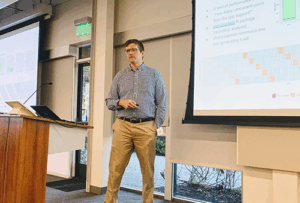Cutting-Edge Content, Focused Discussion, Passion Define BBSW
Jing Huang

From left: Jing Huang, Richard Simon, Mike Crager, Merrill Birkner, Corsee Sanders, Imola Fodor, and D. Whedy Wang take part in a leadership panel at BBSW 2019.
ASA Biopharmaceutical Section
ASA Bay Area Chapter
Bay Area Entrepreneurs in Statistics
Center for Innovative Study Design at Stanford University
DahShu
For the second year in a row, the Bay Area Biotech-Pharma Statistics Workshop (BBSW) was successful in providing statisticians, data scientists, and other colleagues with a venue to connect, learn, and grow.
This year, two events were added on the day before the workshop. One was a short course taught by Rebecca Hubbard from the University of Pennsylvania, titled “Analysis of Big Healthcare Databases.” This course was sponsored by the ASA Council of Chapters through the program of traveling courses and co-hosted by BBSW and the Bay Area Chapter (SFASA), a close strategic partner of BBSW.

Alan Dipert of RStudio was a keynote speaker at the Biotech-Pharma R User Meetup. He shared tips and knowledge about Shiny, R tools for AI, and how to establish a collaborative culture through inner sourcing.
The workshop started with opening remarks by Imola Fodor of Genentech and the chair of BBSW 2019. She shared the history of BBSW and this year’s theme: innovation and leadership.
Fodor’s welcome was followed by a keynote address by Jeff Helterbrand of Genentech, titled “The Future of Data Science in Biotech-Pharma.” He began with an overview of data science development over the last 60 years in the biotech-pharma industry, then touched on the importance of FAIR (Findable, Accessible, Interoperable, and Reusable) data, and ended with a discussion about leadership in the digital era and why analytical leaders such as statisticians are critical.
Two invited sessions followed, one on complex innovative designs and the other on informing personalized health care with real-world evidence (RWE). In a talk titled “Using Natural History Data as a Comparator in an Ultra-Orphan Disease Indication,” Peter Slasor of BioMarin discussed technical and regulatory challenges BioMarin faced with RWE data in getting drug approval.
The afternoon keynote was presented by Steven Goodman, a world-renowned statistician and professor of medicine at Stanford University. He discussed what type of critical thinking is necessary to develop truly useful biomarkers and diagnostic tools.
Next up were lightning talks, which focused on emerging technologies. Session Chair Ray Lin gave an overview, connecting these up-and-coming technologies and highlighting each one’s relevance to advancing precision health. Next, Marina Sirota from the University of California, San Francisco, provided an overview of computational drug discovery. Shirley Wu from 23andMe described that company’s data-driven approach and the power of billions of data points.
Day one concluded with a banquet accompanied by a panel discussion on leadership and career development. It was moderated by Whedy Wang of Theravance Biopharma. Panelists were Merrill Birkner of 23andMe, Mike Crager of Genomic Health, Fodor, Jing Huang of Veracyte, Corsee Sanders of Juno Therapeutics, and Richard Simon of the National Cancer Institute.
The second day began with Part II of the innovative design talks. A presentation by Yi Liu of Nektar provided a perspective on sample size estimation in adaptive designs by using the return of investment as the guiding principle. It was followed by another invited session on biomarker and machine learning.
Liang Fang of MyoKardia hosted the annual leadership forum luncheon, during which several biometrics leaders participated in a discussion about setting leadership goals for the BBSW community.
The afternoon session involved a panel discussion on collaboration at the intersection of statistics, bioinformatics, and data science moderated by Tara Maddala, a well-known biotech leader. Panelists from academia and industry shared their perspectives on skills to master in an era driven by data science and the unique advantage of statistical training. It was followed by the second half of the lightning talks.
Around 300 people attended the workshop and more than 20 companies helped sponsor the event. The secret sauce to BBSW’s success has three key ingredients: cutting-edge technical content, focused discussion on leadership strategies, and synergistic passion from all participants.

















